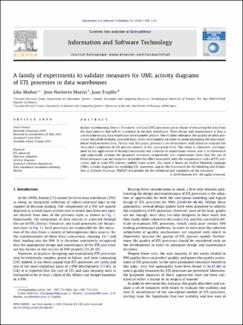El sistema se apagará debido a tareas habituales de mantenimiento. Por favor, guarde su trabajo y desconéctese.
A family of experiments to validate measures for UML activity diagrams of ETL processes in data warehouses
| dc.contributor.author | Muñoz, Lilia | |
| dc.contributor.author | Mazón, Jose Norberto | |
| dc.contributor.author | Trujillo, Juan | |
| dc.date.accessioned | 2018-06-13T20:24:48Z | |
| dc.date.accessioned | 2018-06-13T20:24:48Z | |
| dc.date.available | 2018-06-13T20:24:48Z | |
| dc.date.available | 2018-06-13T20:24:48Z | |
| dc.date.issued | 11/01/2010 | |
| dc.date.issued | 11/01/2010 | |
| dc.identifier.uri | http://ridda2.utp.ac.pa/handle/123456789/4917 | |
| dc.identifier.uri | http://ridda2.utp.ac.pa/handle/123456789/4917 | |
| dc.description | In data warehousing, Extract, Transform, and Load (ETL) processes are in charge of extracting the data from the data sources that will be contained in the data warehouse. Their design and maintenance is thus a cornerstone in any data warehouse development project. Due to their relevance, the quality of these processes should be formally assessed early in the development in order to avoid populating the data warehouse with incorrect data. To this end, this paper presents a set of measures with which to evaluate the structural complexity of ETL process models at the conceptual level. This study is, moreover, accompanied by the application of formal frameworks and a family of experiments whose aim is to theoretical and empirically validate the proposed measures, respectively. Our experiments show that the use of these measures can aid designers to predict the effort associated with the maintenance tasks of ETL processes and to make ETL process models more usable. Our work is based on Unified Modeling Language (UML) activity diagrams for modeling ETL processes, and on the Framework for the Modeling and Evaluation of Software Processes (FMESP) framework for the definition and validation of the measures. | en_US |
| dc.description.abstract | In data warehousing, Extract, Transform, and Load (ETL) processes are in charge of extracting the data from the data sources that will be contained in the data warehouse. Their design and maintenance is thus a cornerstone in any data warehouse development project. Due to their relevance, the quality of these processes should be formally assessed early in the development in order to avoid populating the data warehouse with incorrect data. To this end, this paper presents a set of measures with which to evaluate the structural complexity of ETL process models at the conceptual level. This study is, moreover, accompanied by the application of formal frameworks and a family of experiments whose aim is to theoretical and empirically validate the proposed measures, respectively. Our experiments show that the use of these measures can aid designers to predict the effort associated with the maintenance tasks of ETL processes and to make ETL process models more usable. Our work is based on Unified Modeling Language (UML) activity diagrams for modeling ETL processes, and on the Framework for the Modeling and Evaluation of Software Processes (FMESP) framework for the definition and validation of the measures. | en_US |
| dc.format | application/pdf | |
| dc.language | eng | |
| dc.language.iso | eng | en_US |
| dc.rights | https://creativecommons.org/licenses/by-nc-sa/4.0/ | |
| dc.rights | info:eu-repo/semantics/openAccess | |
| dc.subject | ETL processes | en_US |
| dc.subject | Measure validation | en_US |
| dc.subject | Activity diagrams | en_US |
| dc.subject | engineeringData warehouse conceptual modelingQuality | en_US |
| dc.subject | Empirical Software engineering | en_US |
| dc.subject | Data warehouse conceptual modeling | en_US |
| dc.subject | Quality | en_US |
| dc.subject | ETL processes | |
| dc.subject | Measure validation | |
| dc.subject | Activity diagrams | |
| dc.subject | engineeringData warehouse conceptual modelingQuality | |
| dc.subject | Empirical Software engineering | |
| dc.subject | Data warehouse conceptual modeling | |
| dc.subject | Quality | |
| dc.title | A family of experiments to validate measures for UML activity diagrams of ETL processes in data warehouses | en_US |
| dc.type | info:eu-repo/semantics/article | |
| dc.type | info:eu-repo/semantics/publishedVersion |
